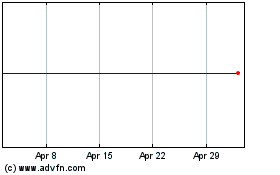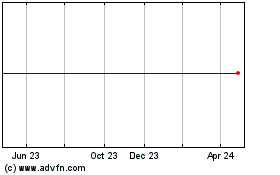By Robert McMillan and Jeff Horwitz
Facebook Inc. and Twitter Inc. took the unusual step of limiting
the sharing of New York Post articles that made new allegations
about Democratic presidential nominee Joe Biden that the Biden
campaign denied.
The Post said its reports were based on email exchanges with
Hunter Biden -- Joe Biden's son -- that were provided by allies of
President Trump, who in turn said they received them from a
computer-repair person who found them on a laptop.
Twitter on Wednesday blocked users from posting links to the
articles, initially citing a potential violation of its rules
regarding hacked materials. The company later said the articles
also violated its policies on displaying private information like
email addresses and phone numbers without a person's permission.
Chief Executive Jack Dorsey said the company's failure to give
context around its actions was "unacceptable."
Twitter's move came after Facebook also limited the distribution
of the articles on its platform, saying it was awaiting guidance
from its third-party fact-checking partners -- independent
organizations that routinely review the accuracy of viral content.
Facebook has slowed the spread of the Post articles pending a
decision by those partners, company spokesman Andy Stone said in a
Twitter message on Wednesday morning.
Mr. Stone said the action is in keeping with rules Facebook
announced last year to prevent election interference. Facebook said
in a blog post last October it would temporarily reduce
distribution of certain content until the facts were better
established to stem misinformation. "Quality reporting and
fact-checking takes time," company executives wrote at the
time.
The Post articles, published Wednesday morning, cited emails it
said were written and received by Hunter Biden. One article
included a copy of an email said to be sent to Hunter Biden
apparently describing a meeting between his father and an executive
at the Ukrainian energy firm Burisma Holdings, on whose board
Hunter Biden served. The Wall Street Journal hasn't independently
verified the Post articles.
The Biden campaign said that no such meeting took place and said
the Post didn't ask the campaign about critical elements of the
story ahead of publication.
In response to questions from the Journal, a Post spokeswoman
provided a link to a Post editorial condemning the Twitter and
Facebook actions and saying that "no one has disputed the veracity"
of its reporting. "Facebook and Twitter are not media platforms.
They're propaganda machines," the editorial said.
News Corp -- the corporate parent of Journal publisher Dow Jones
& Co. -- also owns the New York Post. A News Corp spokesman
declined to comment. Including digital editions, the Post has a
daily circulation of just under 400,000, according to News Corp
filings.
Alan Duke, a founder of Facebook fact-checking partner Lead
Stories, said that Facebook hadn't asked its partners to handle the
Post articles differently from other content.
"This was really just the normal process," Mr. Duke said, adding
that verifying the authenticity of the documents and events cited
in the Post could be difficult. "I can tell you it's a heavy lift,"
he said.
While all news articles on Facebook are eligible for
fact-checking, Facebook pages and less prominent outlets generally
receive the bulk of the platform's scrutiny, according to
interviews with fact-checkers who work with the company. If an
article is judged substantially false, Facebook says it ceases
recommending the content, appends the material with a notice about
the fact-checker's evaluation and assigns a strike to the
publication. If a publication is found to repeatedly publish what
it deems to be false information, Facebook implements more
systematic restrictions.
The actions from Facebook and Twitter drew condemnation from
Sen. Josh Hawley, a Missouri Republican who has previously
criticized how tech companies police content. "The seemingly
selective nature of this public intervention suggests partiality on
the part of Facebook," Mr. Hawley wrote in a letter to Facebook CEO
Mark Zuckerberg that the senator's office made public.
White House press secretary Kayleigh McEnany said Twitter
temporarily blocked her from using her personal account after
tweeting a link to one of the Post articles. Twitter said that it
required Ms. McEnany to delete the tweet before she was able to
continue posting from the account.
Facebook representatives didn't immediately respond to questions
about how frequently its fact-checking partners review articles
from major news outlets and the specific process through which the
Post stories were selected for review. A New York Post column
speculating that the virus that causes Covid-19 might have escaped
from a Chinese laboratory was rated false by a fact-checker earlier
this year. Facebook later lifted the restriction.
Search engines appeared to take a different approach regarding
Wednesday's Post articles. Google was automatically suggesting
terms such as "Hunter Biden laptop" -- a search query that would
lead to the Post articles -- when people typed Hunter Biden's name
into the company's search engine, and the Post's recent articles
were ranked high in searches. A Google spokeswoman didn't
immediately comment on the matter.
According to the Post, the emails at the center of its articles
were found on a computer that was abandoned at a Delaware
computer-repair shop. A copy of the computer's hard drive was then
provided to Robert Costello, a lawyer for Rudy Giuliani, the Post
reported. Mr. Giuliani is Mr. Trump's personal lawyer.
In an interview Wednesday, Mr. Giuliani declined to discuss the
circumstances of how he obtained the hard drive and said he didn't
know if it was obtained through a hacking operation.
"Could it be hacked? I don't know. I don't think so," Mr.
Giuliani said. "If it was hacked, it's for real. If it was hacked.
I didn't hack it. I have every right to use it."
Investigations from the press and Congress "have all reached the
same conclusion: that Joe Biden carried out official U.S. policy
toward Ukraine and engaged in no wrongdoing," said Andrew Bates, a
Biden campaign spokesman, in a statement.
Hunter Biden served on the board of Burisma in 2014 until 2019,
the first few years of which his father was vice president and
overseeing a U.S. anticorruption push in the country. In a July
2019 phone call, Mr. Trump urged the newly elected Ukrainian
president to announce an investigation into the Bidens in a
conversation that was later flagged by a whistleblower, a call that
ultimately led to his impeachment in the Democratic-led House.
Hunter Biden has denied wrongdoing and said he exercised poor
judgment in joining Burisma's board while his father's vice
presidential duties included Ukraine. A recent investigation by
Republican senators didn't demonstrate that his father sought the
removal of Ukraine's top prosecutor in 2016 to protect Burisma from
investigation. Vice President Biden's actions at the time had the
support of the Obama administration, Republicans in Congress and
U.S. allies and were aimed at a prosecutor broadly viewed as
corrupt.
Thomas Rid, a professor of strategic studies at Johns Hopkins
University who studies cybersecurity and election interference,
said social-media companies are "doing the right thing by being
cautious here."
Mr. Rid said there have been instances of last-minute email
dumps ahead of elections in disinformation campaigns and that,
while the source of the emails in question may be legitimate, the
timing and the lack of independently verifiable information also
raises a number of red flags.
Regardless of the social-media companies' approach to the Post's
story, the controversy illustrates questions about the process of
selecting content for fact-checking, said Mike Ananny, a journalism
professor at the USC Annenberg School for Communication who has
studied Facebook's fact-checking program. "When Facebook and
Twitter are in the business of deciding what journalistic content
should appear on its networks, they're not a neutral channel," Mr.
Ananny said.
Ken Thomas, Dustin Volz and Rebecca Ballhaus contributed to this
article.
Write to Robert McMillan at Robert.Mcmillan@wsj.com and Jeff
Horwitz at Jeff.Horwitz@wsj.com
(END) Dow Jones Newswires
October 15, 2020 10:58 ET (14:58 GMT)
Copyright (c) 2020 Dow Jones & Company, Inc.
Twitter (NYSE:TWTR)
Historical Stock Chart
From Mar 2024 to Apr 2024

Twitter (NYSE:TWTR)
Historical Stock Chart
From Apr 2023 to Apr 2024
